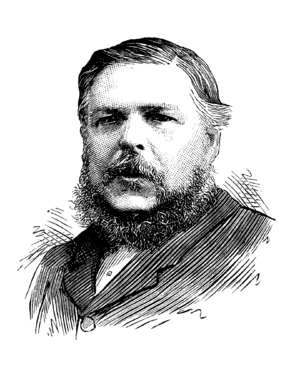Robert Giffen facts for kids
Quick facts for kids
Robert Giffen
|
|
|---|---|
 |
|
| Born | 22 July 1837 |
| Died | 12 April 1910 (aged 72) Fort Augustus, Scotland
|
| Alma mater | University of Glasgow |
| Occupation | Economist, statistician |
Sir Robert Giffen (22 July 1837 – 12 April 1910) was a famous Scottish statistician and economist. A statistician is someone who collects and studies numbers and data, while an economist studies how money, goods, and services are made, shared, and used. Giffen was known for his work in both these areas, especially for his ideas about how people spend their money.
Contents
Robert Giffen's Life Story
Early Life and Journalism
Robert Giffen was born in a place called Strathaven in Lanarkshire, Scotland. When he was young, he started working in a lawyer's office in Glasgow. While there, he also took classes at the university.
Later, he became a journalist, which means he wrote for newspapers and magazines. He worked for the Stirling Journal before moving to London in 1862. In London, he joined the staff of the Globe newspaper. He also helped John Morley with a magazine called the Fortnightly Review.
In 1868, Giffen became the assistant editor for The Economist, a very important financial newspaper. He also worked as the city editor for the Daily News and later for The Times, another major newspaper. Through these jobs, he became well-known as a financial writer and an expert in statistics.
Working for the Government
Because of his strong reputation, Robert Giffen was asked to join the government's Board of Trade in 1876. The Board of Trade was a government department that dealt with business and trade. He became the head of its statistical department, where he was in charge of collecting and analyzing important numbers about the country's economy.
He continued to rise in his career, becoming an assistant secretary in 1882 and then the controller-general in 1892. He retired from this role in 1897. As the government's main adviser on statistics, he wrote important reports, gave advice to official investigations, and checked government accounts.
Awards and Recognition
Robert Giffen received many honors for his work. He was the president of the Statistical Society from 1882 to 1884. This society is a group for people who study and use statistics. In 1891, he was made a Companion of the Order of the Bath, which is a special award given by the British monarch.
In 1892, he was chosen as a Fellow of the Royal Society, a very old and respected group of scientists. He also received the Guy Medal (gold) from the Royal Statistical Society in 1894, which is a top award for statisticians. In 1897, he became a member of the Royal Swedish Academy of Sciences.
Giffen continued to be involved in public discussions about money and taxes, and his knowledge was highly respected. He was given an even higher honor, becoming a Knight Commander of the Order of the Bath, in 1895. This meant he was given the title "Sir." Sir Robert Giffen passed away on 12 April 1910, in Fort Augustus, Scotland.
Robert Giffen's Important Ideas
Key Publications
Sir Robert Giffen wrote many essays and books about money and the economy. Some of his most important works include:
- American Railways as Investments (1873)
- Essays on Finance (1879 and 1884)
- The Progress of the Working Classes (1884)
- The Growth of Capital (1890)
- The Case against Bimetallism (1892)
- Economic Inquiries and Studies (1904)
The Giffen Good Concept
One of the most famous ideas named after him is the concept of a Giffen good. This is a very unusual situation in economics. Normally, if the price of something goes up, people buy less of it. But a Giffen good is different: if its price goes up, people actually buy more of it!
A famous economist named Alfred Marshall mentioned this idea in his book Principles of Economics. He explained it like this:
As Mr. Giffen has pointed out, a rise in the price of bread makes so large a drain on the resources of the poorer labouring families and raises so much the marginal utility of money to them, that they are forced to curtail their consumption of meat and the more expensive farinaceous foods: and, bread being still the cheapest food which they can get and will take, they consume more, and not less of it.
This means that for very poor families, if the price of something cheap like bread goes up, they might have so little money left that they can't afford more expensive foods like meat. So, even though bread is more expensive, it's still the cheapest way to get enough to eat, and they end up buying even more of it.
Predicting Economic Warfare
On 25 March 1908, Giffen gave a speech at the Royal United Services Institute in London. He made an important prediction: he said that a major war would severely damage the world's credit system. This would almost completely stop international trade. His idea later inspired the British Navy's plans for economic warfare when World War I began. This meant using economic strategies to weaken an enemy during a conflict.

